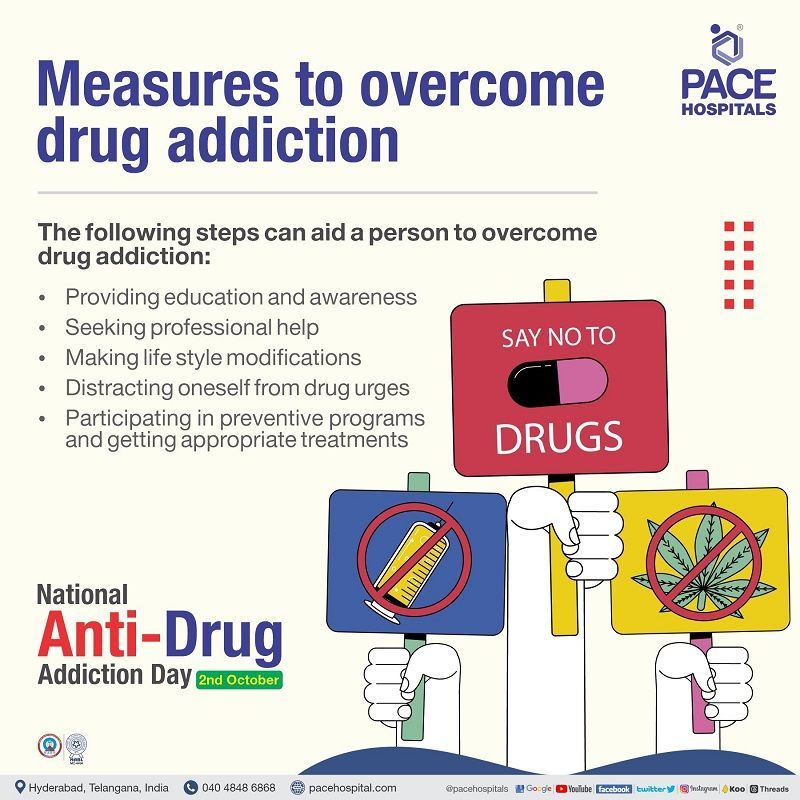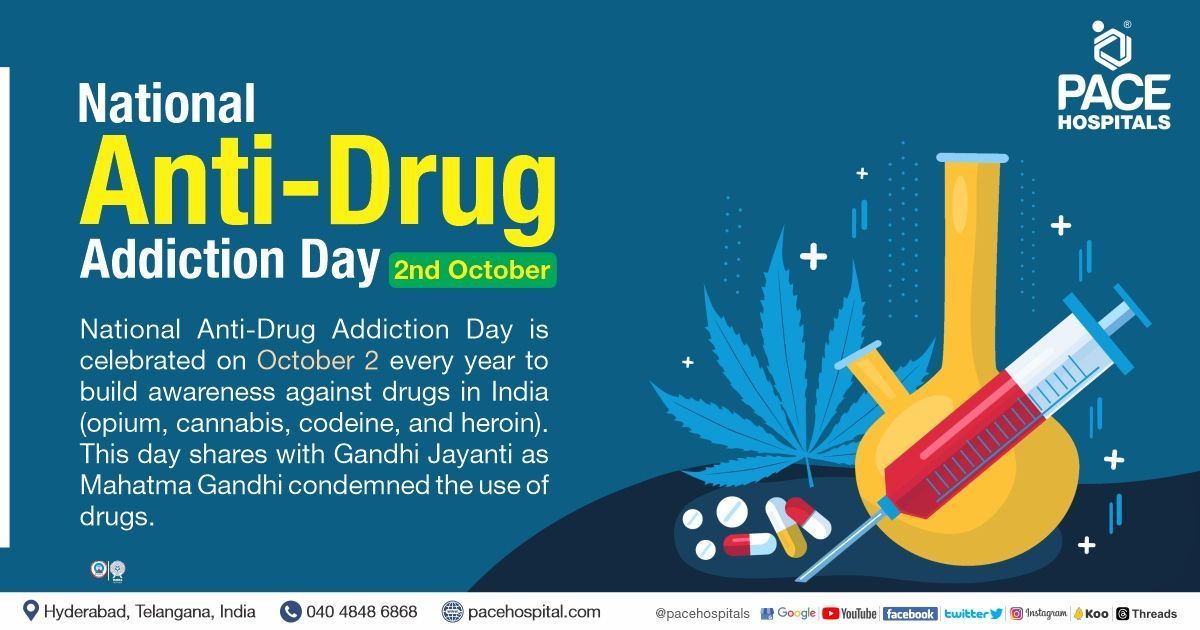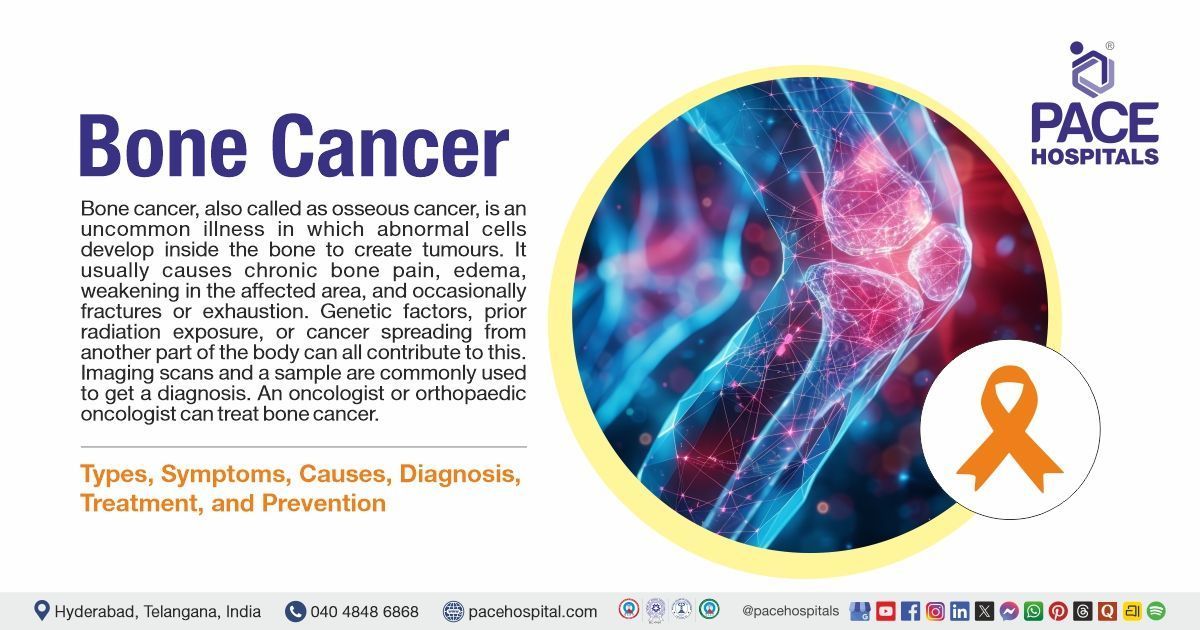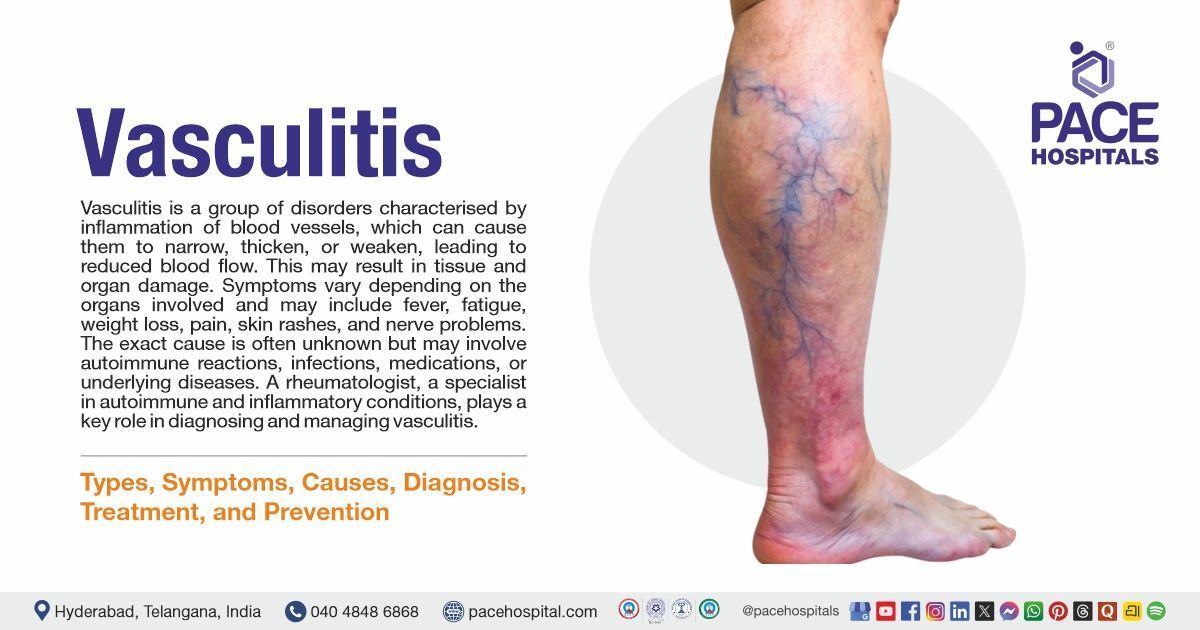National Anti-Drug Addiction Day 2 Oct 2023 - Importance & History
Pace Hospitals
National Anti-Drug Addiction Day is celebrated on October 2 every year to build awareness against drugs in India (opium, cannabis, codeine, and heroin). This day shares with Gandhi Jayanti as Mahatma Gandhi condemned the use of drugs.
Each year, various organisations, communities, and people all over the country join together to work towards a drug-free India and raise awareness of drug addiction. This day serves as a reminder of the continuing battle against drug addiction and support for those affected people.
Overcoming or quitting the drug addiction is a complicated and individualised process that usually requires therapy, support, and a commitment to long-term recovery. This day can raise awareness about the risks of drug addiction and create an atmosphere for drug addicts to seek help by conducting various campaigns.
Importance of National Anti-Drug Addiction Day
Drug addiction is a chronic condition in which a person cannot stop using substances such as (opium, cannabis, codeine and heroin) or becomes dependent on a drug despite harmful consequences. It is characterised by an urge to take the drugs, loss of control over drug use and compulsive drug use.
National Drug Abuse Addiction Day creates awareness of the harmful impact of stigma and discrimination on drug addicts and their families.
- Encourages the use of evidence-based, voluntary services for all people who are addicted to drugs.
- Educate about drug addiction disorders, available treatments and the significance of early intervention and support.
- Empower youngsters and societies to control and prevent drug use and addiction.
Thus, awareness is a powerful remedy for the stigma surrounding addiction. Addiction does not discriminate based on age, gender, race, or ethnicity, thereby, it is essential for everyone to be educated about the problem. Teenagers and young people may be more vulnerable to this addiction because they tend to be more experimental. Educating students about addiction is crucial, and it should be done at a young age.
The use of drugs in India started centuries ago, spanning many years of history. Due to a shortage of proper documentation of statistics in the past (history), India has poor policies to control and prevent this problem.
According to the 2019 survey by the All-India Institute of Medical Sciences (AIIMS) and the National Drug Dependence Treatment Center (NDDTC), alcohol is the most commonly (addicted) substance in India, followed by opioids and cannabis. In India, it is estimated that around 7.21 crore people are affected by drugs. According to the Narcotics Control Bureau (NCB), drug-related cases increased to 12818 in 2013 from 10796 in 2012.
According to the surveys, the drug consumers are estimated to be about 8,50,000 injectable drug users, with 18 lakh adults, and 4,60,000 children. As per a 2004 research report, 87.5 lakh used cannabis, 20 lakhs used opiates and 6 lakh consumed sedatives or hypnotics.
Drug addiction is a serious situation in which a person, family, or friends may feel helpless because it affects the brain and behaviour, which creates an imbalance in a person's self-control and addiction towards drugs. Many people in the nation are addicted to drugs and incapable of quitting. As per psychiatrics opinion, India lacks a system to monitor drug misuse and needs to do work more to encourage drug addicts to seek treatment, as lakhs of drug users are not seeking treatment. This day plays a significant role in encouraging people to seek help if they are struggling with addiction.
History National Anti-Drug Addiction Day
The National Anti-Drug Addiction Day was created by the Union Government against growing drug addiction in India. The National Anti-Drug Addiction Day was conducted on October 2nd, 2015, across the country to mark the birth anniversary of Mahatma Gandhi (father of the nation), who was a strong opponent of drug use (opium, cannabis, codeine and heroin).

Measures to overcome drug addiction
Continuous use of drugs can result in increased dependency, wherein the person's brain refuses to feel good without reaching high levels of dopamine. Quitting or reducing drugs can be challenging because one may be dependent or addicted. However, the following steps can aid a person to overcome drug addiction.
- The initial step in controlling drug addiction is to educate and increase awareness among individuals, that provides a better understanding about the issue and how to manage it effectively.
- Seeking professional help can aid to understand and control the addiction.
- Making lifestyle modifications such as eating a healthy diet, getting good and enough sleep, exercising regularly etc can help prevent triggers
- Distracting oneself from drug urges by keeping busy can help manage addiction.
- Participating in preventive programs and getting appropriate treatments such as
- Psychotherapy –Cognitive Behavioural Therapy (CBT), Acceptance Commitment Therapy (ACT), Dialectical Behavioural Therapy (DBT), and Interpersonal Therapy can be beneficial.
Share on
Request an appointment
Fill in the appointment form or call us instantly to book a confirmed appointment with our super specialist at 04048486868











